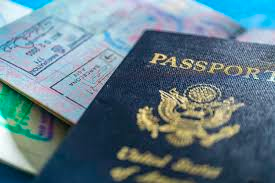Can a Felon Get a Passport?
- antoine922i
- Mar 5, 2024
- 2 min read
Updated: Nov 13, 2024
Navigating the complexities of legal restrictions can be challenging for individuals with felony convictions, especially when it involves international travel. One of the most pressing questions many felons have is whether they can obtain a passport. The answer is not entirely straightforward, but there is hope and specific guidelines to follow.
Eligibility for Passport Application
Generally, having a felony conviction on your record does not prevent you from obtaining a U.S. passport. In fact, the U.S. Department of State, which issues passports, does not deny passport applications solely based on a felony conviction. However, certain types of convictions and legal circumstances may impact your eligibility.
Exceptions and Restrictions
Outstanding Warrants: Individuals with outstanding warrants for felonies may face restrictions or denials in their passport applications.
Drug Convictions: Those convicted of drug trafficking across international borders, specifically if the conviction involved crossing the border with controlled substances, may be denied a passport.
Legal Financial Obligations: Felons who owe child support payments exceeding a certain threshold or have certain government-imposed financial obligations may find their passport applications denied until those debts are settled.
Conditions of Parole or Probation: If your parole or probation conditions explicitly prohibit you from leaving the country, you will likely be unable to obtain a passport.
Applying for a Passport as a Felon
If none of the above restrictions apply, felons can apply for a passport like any other citizen. The standard application process involves submitting a DS-11 form, providing proof of U.S. citizenship, presenting a valid form of identification, paying the required fees, and submitting a passport photo that meets the necessary criteria.
Traveling with a Passport
Obtaining a passport is one thing; being allowed entry into another country is another. It's crucial for felons to research their destination country's entry requirements as some nations have strict policies against allowing travelers with certain criminal records to enter.
Tips for Successful Passport Application and Travel
Check Your Eligibility: Before applying, ensure none of the specific restrictions apply to your situation.
Research Destination Countries: Some countries have entry restrictions based on criminal records. It’s advisable to check with the embassy or consulate of your destination country.
Consult with Legal Counsel: If you’re uncertain about your eligibility or restrictions due to your conviction, seeking legal advice can provide clarity and direction.
Prepare Your Documents: Ensure all documents for the passport application are accurate and complete to avoid unnecessary delays.
Conclusion
While a felony conviction poses certain challenges to obtaining a passport and traveling abroad, it doesn’t outright prevent felons from exploring the world beyond their borders. Understanding the specific restrictions and responsibly preparing your application are key steps towards successful international travel.
